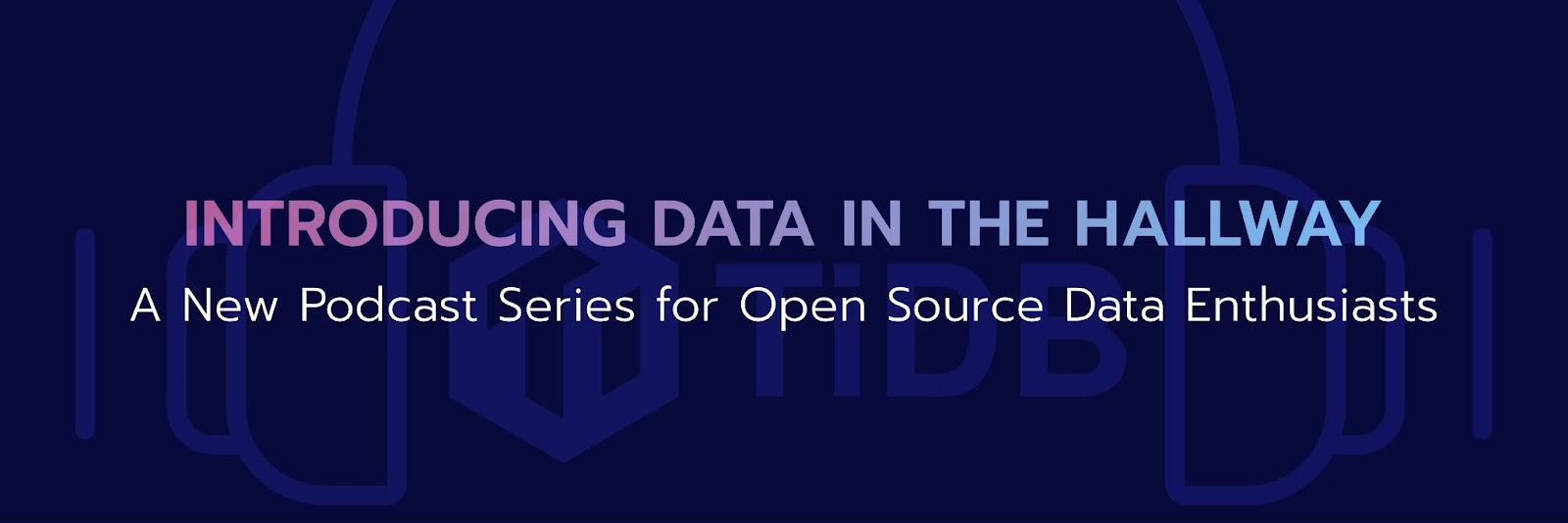
According to the Forbes article, there are more than two million independent podcasts today. So, it was only natural to ask ourselves: Does it make sense to start yet another podcast? Some of the reasons why we personally like podcasts are that they’re easy to consume, have a more casual format, and there’s a sense of intimacy (almost like a hallway conversation).
We definitely didn’t set out to compete with other podcasts. Honestly, we wouldn’t even know how to go about doing that. But we wanted to provide new content and have another way of conversing with our current and future community members.
We launched our new podcast series, Data in the Hallway, about three months ago, and we just recorded our 10th episode earlier in the week. So, we figured now was as good a time as ever for a bit of reflection on what we learned.
Our Observations So Far
We tried to maintain a good mix of PingCAP employees and external guests as podcast interviewees. We liked this balance as this helps bring diverse perspectives to our conversations. In addition to discussing the latest in database technology and what we’re working on with TiDB, we also tried to discuss events of interest to the community such as the TiDB FutureApp Hackathon and the HTAP Summit.
Many of the speakers also liked the podcast format. Since there are no slides, they didn’t have to devote as much time for preparation and were able to be more casual. The only preparation involved agreeing to a list of discussion topics prior to recording, which was typically done over email or a Google doc. It also helped that we tried to keep our episodes to around 30 minutes. No matter how much we’re interested in a topic, we find it difficult to find the time or focus on recordings that go beyond that time length.
The last question we ask all our guests is to share one thing about where they live that most people may not know about. So far, we’ve collected some great travel tips to places like Austin, Mumbai, Nigeria, Poland, and other places around the globe. I hope we’ll be able to keep this tradition going for a long time.
Episode Highlights
We’ve enjoyed and learned a lot from all of our episodes. However, it’s worth highlighting a few popular episodes for readers who are just learning about our podcast.
The Ongoing Popularity of MySQL
In Episode 1, we talked to PingCAP Software Architect Sunny Bains about the ongoing popularity of MySQL. We all know about hype curves, as there’s a new technology that everyone seems to be talking about for a few years before moving on to the next big thing. So the longevity of MySQL is pretty amazing. That means there is no better person to talk to about the history and the popularity of MySQL than Sunny, as he has more than 15 years of experience at Oracle working with the MySQL community. It was great to get his insights on the community and key features of MySQL.
YouTube video playerThe Birth of OSS Insight
In Episode 4, we enjoyed talking to PingCAP Product Leader Fan Wang about OSSInsight, a tool that provides online data analysis of open source software based on nearly six billion rows of GitHub data. We discussed PingCAP engineers pushing the envelope on new technologies from TiDB and other communities (e.g., Open AI) while building this tool that can be used by other open source communities. Stories about how open source projects got started are always fascinating, so it was nice to learn more about the early days of OSSInsight.
YouTube video playerHelping Farmers in Sub-Saharan Africa with TiDB Serverless
Finally, Episode 9 features two participants from our recent TiDB FutureApp Hackathon. I was impressed by how Festus Idowu and Victor Olufemi wanted to build a solution—including IoT devices—to help farmers in Nigeria and beyond. It’s always great to see people using technologies to help address social needs. We were glad to hear that TiDB Serverless helped them in their endeavors.
YouTube video playerLooking Ahead
What we’ve noticed about successful podcasts is a clockwork-like cadence of episodes. Beyond metrics like downloads, subscribers, and views, their predictability is what really impressed us. In terms of future topics, there’s no shortage of ideas, but we’ll look to have more episodes with our community members who can share their experience as users or contributors.
We also want to explore ways to engage with listeners on our episodes. Whether that’s through comments on YouTube (where all our podcast recordings reside), social media, or other channels, we want to continue some of the conversations that we start on the podcast. If you have any suggestions for engagement or ideas for future podcasts, please feel free to email us at podcast@pingcap.com.
We hope we’ll cross paths in our future episodes. In addition to YouTube, you can find them on your favorite podcast platforms including Apple Podcasts, Google Podcasts, Spotify, and many more!
Experience modern data infrastructure firsthand.
TiDB Dedicated
A fully-managed cloud DBaaS for predictable workloads
TiDB Serverless
A fully-managed cloud DBaaS for auto-scaling workloads




